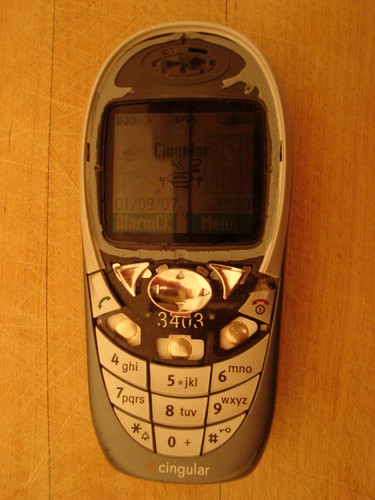Tom Evslin says Apple Fails to Reinvent Telecommunications Industry:
Steve Jobs claims that iPhone will “reinvent†the telecommunications sector. Wish it were so but it ain’t!
The design of the phone – no hard buttons, all touch on screen, sounds like everything we expect from Steve and from Apple: it’s all about the GUI and that part’ll be fun. But the business relationship is as old school as it can get: exclusive US distributorship through Cingular
…
Short term this is a good tactic for Apple because it protects the iPod franchise for a while. Long term I think it’s terrible strategy. It invites an endrun from someone who IS willing to reinvent the industry or simply allies themselves with a Cingular competitor.
…
Remember how wonderful the Mac GUI was? But it only ran on machines from Apple. Remember how crappy Windows was at first? But it ran on machines from everyone and their brother. And now there’s Linux – even less restricted – running on anything that moves. Tell me again why it makes sense to have a phone that runs only on a service from at&t (in the US).
Like other Apple products, the iPhone is eye candy (ugly to me), but not revolutionary.
It looks like the FIC Neo1973, showing at CES, due to ship this quarter for US$350, running the OpenMoko platform (presentation), will be more in the right direction — unlocked and open for developers. Andy on the openmoko list has a very early comparison.
The Neo1973’s big missing feature, at least initially, is apparently Wi-Fi, due to a lack of open drivers. As a late adopter of gadgets, I can wait. I acquired my first and only mobile phone in 2003, and it’s easy on the eyes.
That said, I’d really like Portable online by 2010 to be true:
This claim is judged YES if and only if, by January 1, 2010, in any state with more than 5 million inhabitants, at least 25% of the adult population are “portably online”. A “state” can be a country or a member state in a federation.
Read more for how “portably online” is defined (the contract was written in 1995). My current guess (and the market’s; last trade at 30) is that without a more significant smartphone revolution than we’re seeing the criteria won’t be met before 2010, but not terribly long after.
OpenMoko via Jon Phillips. Second word in post title refers to a silly slide found at Engadget.


[…] Mike Linksvayer thinks that the iPhone isn’t revolutionary because it isn’t open. I think I disagree; revolutions can happen along any of multiple dimensions, and iPhone’s ease of use and advanced integration with the PC can be revolutionary, even if the closedness (patents, crappy Cingular-only network) are more of the Same Old Stuff. More on that later; but in a nutshell I feel like I’m working on a really, really nice horse and buggy right now, and Apple just released prototypes for a model T. […]
Hi there.
Couldn’t agree more. My points are described on my blog where I even compare tech specs from Nokia N800 and the iPhone. Would like to read your opinion on that.
Cheers,
PP
Paulo, the N800 looks cool, but it lacks cellular connectivity (without an external phone conntected via bluetooth anyway), making it a pretty niche product. Wi-Fi isn’t that ubiquitous yet.
The reason I’m betting against “Portable online by 2010” is the phrase “provides access to general-purpose computing” in the detailed claim description. The Judge’s statement makes me think he reads that the same way I do: the ability to download plug-ins isn’t enough if most people don’t have programming tools at hand. I’m not sure whether access to a desktop spreadsheet would count, and I doubt that access to the current web counts as general-purpose computing. OneLaptopPerChild seems to be aiming to have a Python or Squeak environment available on every box, but Jobs has never acted as if this were one of his priorities. If it’s OS X, but most users never get beyond browser and organizer functionality, they may not download a general-purpose computing app.
“The general-purpose computing power must be good enough by the standards of the time to actually use for general-purpose computing work.”
I suspect that if web access isn’t good enough for general purpose computing now, it will be in 2010. For most users general purpose computing amounts to web, email, im, office applications, games, and entertainment, all of which are on the web.
I’m just not sure smartphones adequately powerful for web applications will be in the hands of 25% of the adult population of any jurisdiction > 5m people before 2010. .3 seems like a realistic probability of that occurring.